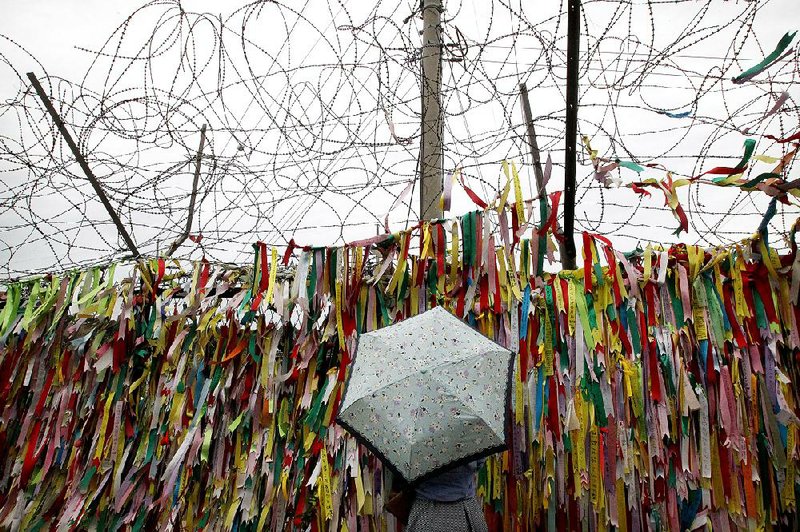SEOUL, South Korea -- North Korea and South Korea's mutual disdain was apparent.
State-run news outlets in the North often refer to President Park Geun-hye of South Korea as a prostitute. Park does not hide her contempt for Kim Jong Un, the North's leader, calling his policies "delusional."
Analysts said each leader had domestic political reasons to want to show toughness and resolve during the tense military standoff on the Korean Peninsula that ended Tuesday when the two sides struck a deal.
Before the agreement, the confrontation escalated swiftly to the brink of armed conflict, but each leader had reasons to want to appear statesmanlike and in command of events.
"Both leaders will interpret the deal in their own different way and claim victory," said Yang Moo-jin, an analyst at the University of North Korean Studies in Seoul. "Park Geun-hye says her patient, principled approach on the North has finally worked. Kim Jong Un will say his daring initiative forced the South to a bargain."
Some observers said the agreement opened up at least the possibility the relationship could improve to some degree.
"This deal is a real watershed for the two Koreas," said John Delury, a professor of history at Yonsei University in Seoul who specializes in China and North Korea. "This is a promising beginning."
South Korea kept its side of the bargain at noon Tuesday, shutting off the propaganda blaring from loudspeakers at the border, according to the Defense Ministry. The North had said the loudspeaker broadcasts affronted Kim's "supreme dignity."
In return, North Korea relaxed its military from a state of high alert and expressed "regret" over the wounding of two South Korean border guards by land mines this month. The wording fell a bit short of the explicit apology the South had demanded, but South Korea decided it was close enough.
The countries also agreed to hold further talks and revive a sporadic program of reunions for families separated by the Korean War. The drama of those reunions has often led to calls on both sides to ease hostilities.
South and North Korea technically have been at war since 1950, with combat halted only by a truce, not a peace treaty. But their relations have been especially testy under their current regimes.
Under Kim, North Korea launched a long-range rocket in December 2012 and conducted its third nuclear test the next February, a few weeks before Park was sworn into office. When the United Nations responded with more sanctions, his government threatened to annihilate the South "in a nuclear holocaust," and South Korea responded with a promise to "wipe the North off the face of the earth."
Park's tough talk helped her image as a leader who did not give in to bombast from Pyongyang, a strategy that appealed to the conservative South Koreans who supported her. Her approval ratings, battered by her government's mishandling of a deadly ferry disaster last year and a deadly viral outbreak this year, rose substantially during the military standoff.
But an early casualty of the brinkmanship was the so-called trustpolitik policy she had promised -- building trust with North Korea to guide it toward more openness, denuclearization and, eventually, reunification. The agreement Tuesday "allows her to finally put meat on the bones" of that strategy, Delury said.
The talks also were a test for Kim, who is believed to be in his early 30s and who inherited Pyongyang's totalitarian government from his father, Kim Jong Il, in late 2011.
Kim has yet to deliver on his promise to improve North Korea's economy, a task hindered by sanctions and the drying up of aid and trade that once flowed from the South.
Analysts said the deal showed that despite having purged many of his father's time-tested advisers, Kim was able to oversee a complicated negotiation with the South. The talks lasted for days in part because the North's negotiators -- senior figures in the government -- had to leave the bargaining table frequently to consult with Pyongyang, South Korean officials said.
"If you look at how this talk came about and how it led to a deal, you get a clear sense that Kim Jong Un has been calculating it carefully," Yang said.
The expression of "regret" over the land mine episode can be explained to the North Korean public as a gesture of sympathy rather than an acceptance of responsibility, analysts said. The North's leaders have framed such concessions that way in the past, according to the analysts.
"I even doubt that North Korea really cared that much about the South Korean loudspeakers, whose impact is never proven," said Kim Dong-yup, also of the University of North Korean Studies. "Its outcries about them may very likely have been a ploy to provoke and drag the South into talks."
The "regret" compromise also could work for Park, by deflecting criticism that her rigid stance had made the North more provocative, analysts said. And the deal could help dispel her "image as a paper-pushing type of leader," said Lee Byong-chul, a senior fellow at the Institute for Peace and Cooperation in Seoul.
A Section on 08/26/2015

